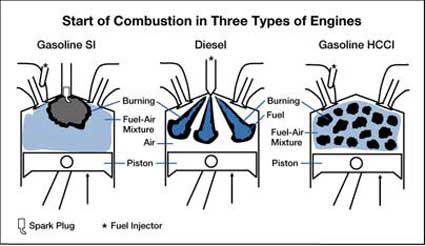MIT researchers have developed a fuel-efficient car engine that doesn’t use a spark to ignite fuel. The homogeneous charge compression ignition engine (HCCI) combines elements from standard spark ignition and diesel engines. Researchers say the engines cut pollution and improve fuel economy by several miles per gallon and could lead to engines with double the fuel economy.
The research team showed off their findings to the Japan Society of Automotive Engineers on July 23rd. Fuel in the HCCI engine is pre-mixed with air before being injected into a cylinder. A piston then compresses the mixture and causes combustion. Regular gasoline engines use a spark plug to ignite the fuel-air mixture while diesel engines inject fuel into an already compressed and hot chamber.
By premixing the fuel and then injecting into the chamber, researchers say combustion occurs evenly which reduces pollution. However, researchers admit that HCCI engines are a bit more finicky when it comes to temperatures and fuel composition. Large variations in either can drastically cut power by making the combustion occur during the wrong stroke cycle.
Professor Wai K. Cheng of MIT’s Department of Mechanical Engineering has partially fixed that problem by creating a hybrid engine that runs in standard spark ignition mode most of the time and then switches to HCCI mode when temperatures and fuel are just right. Cheng and his team believe the engine operates in HCCI mode 40 percent of the time.
An HCCI engine improves fuel efficiency by a few miles per gallon and if most cars used them, the researchers say nationwide oil consumption could be reduced by a million barrels a day.

